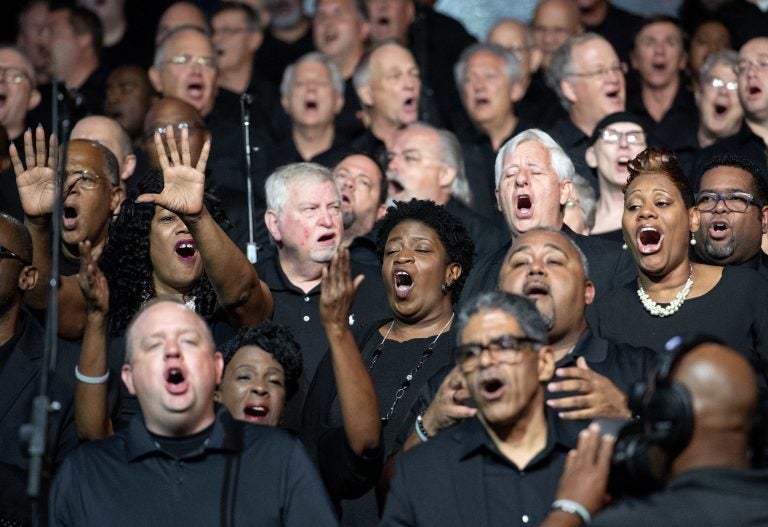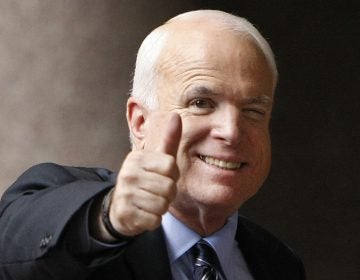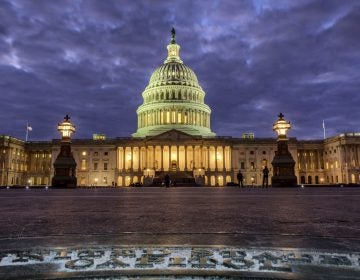Even the faithful push back on mixing politics, religion
NewsWorks Tonight host Dave Heller sits down for his weekly conversation with Gallup’s Frank Newport to talk about trends in U.S. opinion.
Listen 7:07
Choir members sing worship songs during the Southern Baptist Convention's annual meeting on Tuesday, June 12, 2018, at the Kay Bailey Hutchison Convention Center in Dallas. (Jeffrey McWhorter/AP Photo)
NewsWorks Tonight host Dave Heller sits down for his weekly conversation with Gallup’s Frank Newport to talk about trends in U.S. opinion.
Philadelphia-based Comcast announced an unsolicited offer of $65 billion for most of 21st Century Fox, putting the cable giant in a bidding war with Disney. This comes just after a judge OK’d the merger of Time-Warner with AT&T.
But the public largely opposes the creation of bigger and bigger companies, so it could create an image problem the larger Comcast grows. The more the company can position itself as a computer company rather than a telephone or cable company, the better.
President Donald Trump set off a controversy after leaving the G-7 summit in Ontario on his way to Singapore by calling Canadian Prime Minister Justin Trudeau “weak” and “dishonest.”
The data on how Americans view Canada, and vice versa, show a huge imbalance. Americans love Canada; the 94 percent favorable rating is the highest of any country tested. And they also give very high ratings to the other G-7 countries.
But only 20 percent of Canadians interviewed (before the summit) said they view U.S. leaders positively, an enormous drop from the previous years. Residents of the other G-7 countries had similar (although not quite as bad) views of U.S. leadership. It’s unlikely Trump’s actions hurt his image in the minds of residents of the G-7 countries, since his image was so bad to begin with.
Vice President Mike Pence spoke at the annual meetings of the nation’s largest Protestant denomination — the Southern Baptist Convention — this week in Dallas. That led to push-back from many at the convention who did not want to see politics and religion mixed that way, according to CNN and Washington Post news reports.
In a campaign-style speech, Pence extolled the accomplishments of the Trump administration. Data show a natural connection between highly religious Protestant evangelicals and the Republican Party (and Trump) — but at least a third of evangelicals do not support either.
New data show Pence’s overall image these days at 42 percent favorable and 42 percent unfavorable, on balance more positive than the net image of his boss. Among those who attend church weekly, however, Pence’s image becomes significantly more positive.
Former New York Mayor Rudy Giuliani has inserted himself back into the news over the last several months as Trump’s spokesman. Most recently, Giuliani said it’s unlikely that Trump former lawyer and fixer Michael Cohen had anything incriminating to say about Trump, even if – as reports suggest – Cohen flips.
Giuliani has seen his image plummet to the most negative in Gallup’s records. After 9/11 his favorability rating was as high as 77 percent, but in the just-completed Gallup poll, only 32 percent had a favorable opinion of him.
Former President Bill Clinton, on a book tour for his new thriller “The President is Missing” written with James Patterson, said when asked about Monica Lewinsky and the impeachment scandal: “I dealt with it 20 years ago, plus, the American people, two-thirds of them stayed with me. And I’ve tried to do a good job since then, and with my life and with my work. That’s all I have to say.”
Our review of the data show that Clinton is most likely referring to the fact that Gallup (and other polls) showed that about two-thirds said they didn’t want the Senate to vote for conviction in his impeachment trial in early 1999 (depending on the timing and on the poll). But at the same time, the clear majority of Americans believed that Clinton had committed perjury and less than half had a positive opinion of him “as a person.” So it’s not totally clear what “stayed with me” means in this context.
WHYY is your source for fact-based, in-depth journalism and information. As a nonprofit organization, we rely on financial support from readers like you. Please give today.





